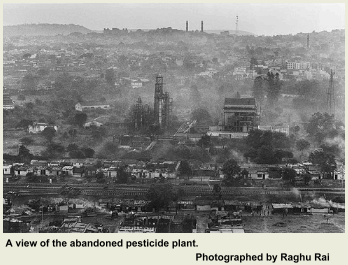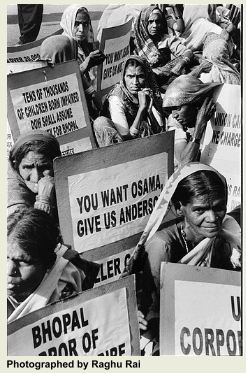|
The papers were delivered by government employees and students alike, dropped in mailboxes and taped on the doors of sprawling mansions. Thirteen of Dow's Boardmembers received the criminal summons this April and May, which were first served on Union Carbide by the Indian Government more than a decade ago. So far, however, Carbide has eluded the summons, ignoring it as they have nearly all of their outstanding legal and moral responsibilities in Bhopal. Students here in the US, organized into the coalition Students for Bhopal, are having none of it; they're making sure that the decision-makers at Carbide and its new owner, Dow, aren't able to escape with impunity.
At least clean water is on the way. For the past fifteen years, the 20,000 residents living around the factory have been forced to drink and use water that's heavily contaminated with the heavy metals and toxic chemicals that Carbide dumped at the factory site. These chemicals are showing up in the breast milk of nursing women, and are contributing to the already devastating health burden that the gas survivors and their children are forced to bear. In May, however, after a long legal struggle, the Indian Supreme Court directed the government of Madhya Pradesh to provide clean, safe drinking water to the residents as expeditiously as possible. been forced to drink and use water that's heavily contaminated with the heavy metals and toxic chemicals that Carbide dumped at the factory site. These chemicals are showing up in the breast milk of nursing women, and are contributing to the already devastating health burden that the gas survivors and their children are forced to bear. In May, however, after a long legal struggle, the Indian Supreme Court directed the government of Madhya Pradesh to provide clean, safe drinking water to the residents as expeditiously as possible.
The 2nd Circuit Court of Appeals in New York has also weighed in on the contamination in Bhopal, ruling that Carbide can be held liable in US courts for the contamination they've left behind. However, the court ruled, Union Carbide can be forced to clean up the contamination at the plant site itself if -- and only if -- the Indian or Madhya Pradesh state government indicates to the court by June 30th that it does not object to the cleanup. "This is such a simple request that we cannot understand why the Indian government would not do it without any hesitation," said Aditi Rajvanshi, a student at Delhi University. Together with several other members of Students for Bhopal, Aditi met with the Indian President in March to appraise him of the situation and urge the government to act. Students in the US have also been active, barraging the Indian embassy with hundreds of emails, phone calls and faxes urging action. Time is short, but this is a crucial opportunity. We can force Carbide to clean up its mess, but only if we act now.
 Editorial Note: On June 23, bowing to pressure from activists all over the world -- and
most importantly, from three long-time activists (Rasheeda Bi, Shahid
Noor and Satinath Sarangi) who had been on a hunger-strike for six days
-- the Indian Government agreed to issue a no-objection (to cleanup)
notification to the New York court. However, there's much to be done yet. Editorial Note: On June 23, bowing to pressure from activists all over the world -- and
most importantly, from three long-time activists (Rasheeda Bi, Shahid
Noor and Satinath Sarangi) who had been on a hunger-strike for six days
-- the Indian Government agreed to issue a no-objection (to cleanup)
notification to the New York court. However, there's much to be done yet.
To take part in the action or find out more, visit www.studentsforbhopal.org.
|